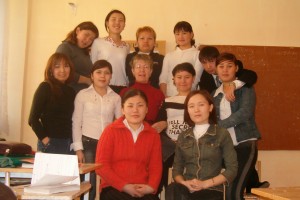I’m continuing with the deleted scenes of my first few weeks as an English teacher at Zhezkazgan Humanitarian College, a pedagogical college preparing future primary school teachers to teach English.
***
The college administration didn’t like team teaching. They saw it as a dangerous temptation for Gulzhahan to relax. But Gulzhahan was not one to coast. She was an Energizer Bunny in high heels and stockings. With her at my side, we were pioneers, leading the way for team teachers of the future. Tuesday mornings, at least, I knew what I was about.

The rest of my class load wasn’t so clear during those early weeks.
“On Thursdays, you will teach English 31. It is a third-year group,” Gulzhahan informed me. “They are also a good group.”
“So, I might have them for the full two years I’m here? That would be great.”
“No, they will graduate in June.”
I knew English 40 and 49 were graduating in June. And Raisa’s English 21 was a second year group. I appeared that the English 40s were seniors; English 30s, juniors; 20s, sophomores; and the tens were the freshmen. But I was wrong.
“Yes, in June, they graduate.”
I never had trouble understanding the words Gulzhahan spoke. My trouble was in understanding their meaning.
“English 40 and 49 have been here four years; they will graduate in June,” she told me one day. “English 31 has been here three years. They will also graduate in June.”
“But they have been here only three years,” I protested, clearly missing something.
“Yes. They have been here three years and they will graduate in June.”
My questions were as confusing for Gulzhahan as her answers were for me. I knew I was doing something odd: questioning. But I didn’t care. There had to be an explanation, something I could wrap my mind around.
Recalling words I’d heard from a marriage counselor in my earlier life, “You need to say it in three sentences; otherwise he’ll not hear you,” I persevered.
“I don’t understand,” I began. “English 31, 40, and 49 are in their last year and they will graduate in June. English 31 has been here only three years but English 40 and 49 have been here four.” Three sentences!
“English 49 and 40 started after ninth grade,” Gulzhahan replied. “English 31 came after eleventh grade, so they have only three years of courses.”
Ah: advanced-placement and non-traditional students, words not yet in Gulzhahan’s vocabulary.

“This is September,” I continued instead. “How do you know everyone will graduate?”
Gulzhahan smiled at me. “They will graduate.” It was true. The group would stay together throughout their four (or three) years, whether they knew the work or not.
The idea of “The Class of —-” could have been so helpful. But I held back, hesitant to introduce “my way” too soon.
What do you think? When is introducing a “more helpful way” a welcome gift rather than an imposition? What would you have done?
Marian Beaman
This sounds like East meets West or maybe even product over process. Hmmm.
What would I have done? Well, for part of the time, I would use cooperative learning groups with representation from each of the “levels” in groups of three with similar assignments. That way gaps in learning among the groups could be detected and compensated for. Three sentences!
I’m sure you were up to the challenge. How did it turn out?
Janet Givens
Hi Marian. Your comment reminded me how much I tried to reorganize these groups that first year (e.g., gifted, middle, remedial). I’d be met with a pleasant smoke and life continued as it had. I had to remind myself I was there to learn their ways too. More next week.
Janet Givens
Err, that was a pleasant SMILE. Dxxx spell checker on my iPhone.
Deleted Scene: School, Part 4 |
[…] grappled with the idiosyncrasies of the larger system for a full year (and write about it here and here). But in those first few months, my challenges within the classroom were an odd mix. The […]